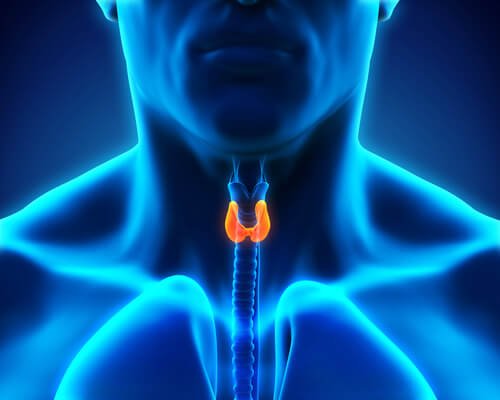Stress and Hyperthyroidism: A Silent Relationship with Serious Effects


Written and verified by the psychologist Valeria Sabater
Stress and hyperthyroidism share a very significant relationship. We don’t often realize the impact chronic stress can have on our health. Cortisol, the hormone associated with these states of hyperactivity and hypervigilance (in other words, stress), ends up altering not only our thyroid function to the point of accelerating it, but also our adrenal glands.
We know that the disorders associated with the thyroid gland are very common and that they develop due to several factors. Thus, autoimmune conditions such as Graves’ disease, pregnancy, alterations in the pituitary gland, or an iodine imbalance can make us develop hypothyroidism or hyperthyroidism.
On the other hand, we don’t always realize just how much our emotions can change our body. They can really affect our metabolism. Thus, studies such as those published in the journal Thyroid Research show there’s a relationship between cortisol levels and TSH (thyroid-stimulating hormone).
In other words, stress represents a risk factor for hyperthyroidism. Pressure, anguish, and constant worry over months or years end up affecting our thyroid function by accelerating it.
Hyperthyroidism develops with an excess of thyroid hormones in the body. Graves’ disease represents a common cause, but chronic stress can also trigger this condition.

The link between stress and hyperthyroidism
Every day there are new diagnoses related to thyroid gland alterations. We can’t forget that the thyroid hormones fulfill a lot of functions. They’re essential for maintaining our tissues healthy and fulfilling infinite metabolic tasks, such as protein synthesis.
That’s why patients with hyperthyroidism usually suffer from a wide range of symptoms and a variety of disorders. These discomforts and associated conditions can be summarized as follows:
- Unusual nervousness and restlessness.
- Mood swings that make the person more irritable.
- Sense of weakness.
- Increase in appetite.
- Weight loss despite having food cravings.
- Memory and concentration problems.
- Goiter: a symptom associated with hyperthyroidism where the person suffers from throat swelling and has trouble swallowing, drinking, or talking.
- Hair loss or thinning.
- Thinner skin.
- Poor heat tolerance.
- Changes in menstruation.
- Tachycardia.
- Insomnia.

In addition, thyroid-related diseases affect more men than women. However, once the diagnosis has been made, we don’t always stop to think about what could have caused it.
Proper treatment is really important because a therapeutic strategy will improve the patient’s quality of life. However, since there’s a direct relationship between stress and hyperthyroidism, we should also know how the body produces it.
Stress and hyperthyroidism: An alteration in thyroid antibodies
In 2012, Dutch universities funded an extensive and comprehensive study to discover the relationship between stress and hyperthyroidism. The significant results of this study were published in the journal Psychoneuroendocrinology. The study showed that cortisol has a serious impact on the thyroid gland in stressful situations.
- Thyroid antibodies become altered and begin to attack the body itself, generating changes such as fatigue, sleep disturbances, impaired digestion, hair loss, thin skin, etc. Changes also commonly occur at a cognitive level, hence the difficulty concentrating and the mood swings.
- People with panic disorders often suffer from thyroid problems. This comorbidity creates a cycle that results in classic hyperthyroidism and has serious clinical repercussions.

Preventing hyperthyroidism caused by stress
Hyperthyroidism (whether caused by stress or not) will undoubtedly have a specific treatment: antithyroid drugs such as propylthiouracil and methimazole. However, each patient’s case is different. Each patient requires a professional evaluation in order to find the most appropriate and effective treatment for them.
But beyond treatment, we need to know how to prevent these conditions. The trigger won’t always be stress because autoimmune diseases exist. But because certain psychological conditions trigger metabolic changes, we must know how to handle these situations. Some keys include:
- Limited stress over time has no effect on the thyroid. The problem is chronic stress that we don’t handle, control, or face. Therefore, we must spend some time every day attending to every worry, every complex emotion, and every nuisance in our mind. Don’t leave for tomorrow the shadow that bothers you today.
- Give yourself quality time. Throughout the day, we must have at least two hours to ourselves. Physical exercise or techniques like mindfulness are very effective for dealing with stress.
- Likewise, take care of your diet and improve your life habits. Focus on quality rest and positive social relationships.
To conclude, since stress and hyperthyroidism are related, taking care of our emotions means investing in our health. If we get up, get dressed, and shower every day, we must also remember to attend to our complex inner universe every day.
All cited sources were thoroughly reviewed by our team to ensure their quality, reliability, currency, and validity. The bibliography of this article was considered reliable and of academic or scientific accuracy.
- AD Kanner , JC Coyne , C. Schaefer , RS Lazarus. Medición del estrés y salud: emociones, tiroides y problemas psicosociales. Journal Behavior. Medicina. 4 ( 1981)
-
A. Matos-Santos , EL Nobre , JG Costa , P.J. Nogueira , A. Macedo , A. Galvão-Teles , J.J. de Castro. Relación entre el impacto de los acontecimientos vitales estresantes y el inicio de la enfermedad de Graves y el bocio nodular tóxico. Revista de Endocrinología. 55 ( 2001 ) pp. 15 – 19
This text is provided for informational purposes only and does not replace consultation with a professional. If in doubt, consult your specialist.








